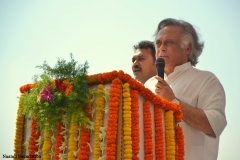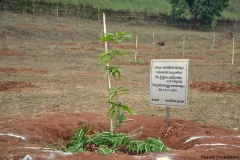By Bernard Giraud, President Livelihoods Venture
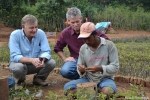 I have just returned from the Araku Valley in Andhra Pradesh (India) where over 5000 adivasi villagers celebrated the 1million fruit trees they have planted this year with the Naandi Foundation. I am so happy to share with you this very impressive and touching moment! Coming from 300 villages, farmers and their families gathered on November 13th for the Forest Festival, demonstrating their commitment to the project. Shri Jairam Ramesh, Minister for Rural Development (and former Minister of Environment) came especially from Delhi to express a vibrant support to the initiative: ‘what you are doing in this valley opens new ways to combat poverty and develop sustainable livelihoods…’
I have just returned from the Araku Valley in Andhra Pradesh (India) where over 5000 adivasi villagers celebrated the 1million fruit trees they have planted this year with the Naandi Foundation. I am so happy to share with you this very impressive and touching moment! Coming from 300 villages, farmers and their families gathered on November 13th for the Forest Festival, demonstrating their commitment to the project. Shri Jairam Ramesh, Minister for Rural Development (and former Minister of Environment) came especially from Delhi to express a vibrant support to the initiative: ‘what you are doing in this valley opens new ways to combat poverty and develop sustainable livelihoods…’
Why Araku ?
Araku is a beautiful valley in the mountains, 3 hours drive from Visakhapatnam a large harbour city on the east coast of India. At 1200m altitude, it offers breathtaking scenery and a favorable climate which allows a wide range of vegetables from paddy to local varieties of cereals, fruits and vegetables as well as cash crops such as coffee and pepper.
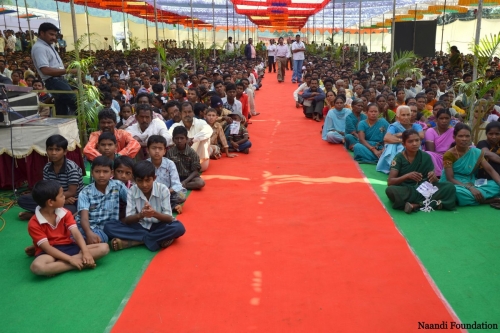
5000 adivasi famers gathered for the forest festival
Araku people are adivasi[“original inhabitants”] tribes, considered among the most disadvantaged in India, with strong cultural and social roots.
The hills and mountains were severely deforested when India was a British colony, which generated erosion, soil degradation and poverty. The Araku people want to restore their living eco-system through the plantation of a “functional forest”, a multi-species and multi layers forest, to generate diversified and healthy food as well as new sources of income.
Community based
The Araku project is a partnership between Naandi Foundation (project developer), Livelihoods Fund (main investor through carbon funding) and Mahindra Ltd (sponsor). It started in 2010 with the plantation of 650 ha of a wide variety of fruit trees: mango, papaya, orange, lemon, drumstick, teak etc. Those fruit and forest trees will be combined with coffee, ginger and pepper to which they provide shade.
Shri Jairam Ramesh Minister for rural
development expresses support
to the livelihoods project
One Millionth Tree planted by Mr. Jairam Ramesh
This year the project reached another level: more than 2000 ha were planted. When I met with farmers, I could feel their mobilisation: trees are planted on degraded lands which today bring little or no income to the farmers. Tomorrow, when the 6000 ha are planted, the multilayer “forest-orchard” will create a very significant value to the community.
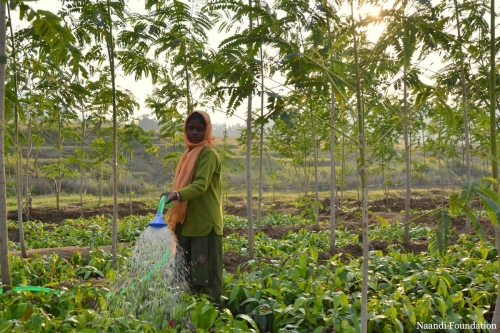
Watering the Mango plants at the Central nursery
We visited several farms and had discussions with individual farmers and village groups. What struck me most is the extraordinary level of engagement: the plantation is truly “their project”, the trees are “their trees”. It means that they take really good care of them. For example, a couple of farmers, husband and wife were so proud to show us their 1ha plantation which was so nicely organised and maintained. They have even built a small hut close to the plantation where they spend nights to make sure that it is well protected.
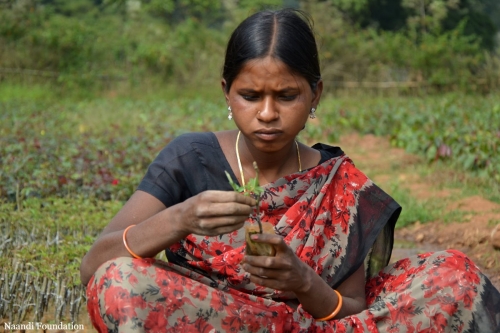
woman working in local nursery
The key role of the Naandi Foundation
The community engagement is the result of an outstanding field work that has been done by the Naandi team, led by David Hogg, a farmer from New Zealand who settled in India 40 years ago and developed an extensive expertise on sustainable farming, biodynamics methods, organic pest control. In less than 2 years, the small Naandi team has been able to develop an incredible organisation based on the impowerment of village representatives and community leaders, as well as a network of nurseries and logistics to provide huge quantities of saplings to the villages.
What about carbon ?
The Araku project is a great illustration of how the Livelihoods Fund works and how it creates “double value” to both the rural community and the investors. Since 2010, Livelihoods Fund has committed to finance the plantation work (nurseries, project management, logistics, monitoring and evaluation. carbon measurement and registration, etc). In return, the Fund will receive certified carbon credits over a 20 year period of time. The total 6000 ha project is designed to sequestrate 1.130 million TCO2 which will contribute to reducing global warming. The Fund will distribute best-in-class carbon credits at a competitive price to its investor-partners. They can use them either to offset part of their carbon emissions or re-invest them in other projects.
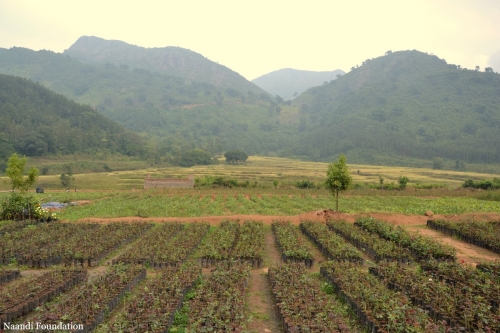
Five nurseries have been installed in the valley to generate the million trees
At the same time, the project will have generated huge amounts of fruits. For example for mangoes only, the plantation will produce 4000 T in the coming years. But also, other fruits as well as coffee, pepper, etc, growing underneath the fruit trees. It is a bit early to evaluate precisely the economic value generated by the complete plantation but it is probably close to 10 times the value of carbon credits.
What’s next ?
It is best to quote Manoj Kumar, the CEO of Naandi Foundation, a great man with a
clear strategic vision and a nice friend. This Araku project would not have happened without this outstanding duo formed by Manoj and David to design, energise and managetheproject.
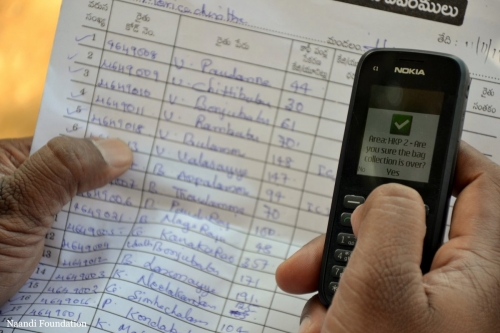
Precise measurement, mapping and monitoring is key success factor-Naandi has developed the livelihoods 360, an innovative tool that works with a gsm
With a second year of success, the livelihoods project in Araku is getting rooted in the community. It is a great achievement but we have a few major challenges ahead for the coming years : develop farmers knowledge on arboriculture and organise them to facilitate access to markets. Based on what has been done with the coffee cooperative, we feel very confident that we can make it” Manoj said


